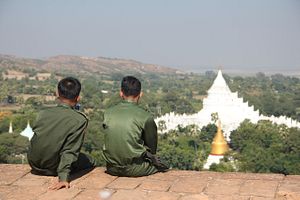Last week, media reports surfaced that Myanmar military officials had attended an Israeli military expo, in spite of human rights issues that had led Israel to restrict aspects of security collaboration between the two countries. While the specifics remain unclear, the reports have nonetheless contributed to yet another round of scrutiny on the defense aspect of Israel-Myanmar cooperation.
The idea of Israel-Myanmar security cooperation is not a new one. There have been reports that trace intelligence cooperation back to the 1950s, and training and arms sales from the 1990s onwards, in spite of occasional denials by Israeli authorities. Both sides even formally inked a memorandum of understanding on military cooperation in the defense sector back in 2015, which covered areas such as exchanges and visits, military training, information sharing, military education, technology acquisition, and humanitarian assistance and disaster relief.
But that collaboration has come under renewed scrutiny over the past few years in the wake of the Myanmar government’s handling of atrocities committed against the Rohingya minority group in the country. While Myanmar is hardly the only country where Israel’s balance of interests and ideals has been scrutinized in this regard, it has been in the media spotlight because it touches on other issues as well, including the outrage expressed by Muslim-majority countries on the Rohingya issue and how Naypyidaw is managing increased censure from Western countries. Seen from that perspective, there have been repeated developments scrutinizing the extent to which security collaboration of any kind between Israel and Myanmar is still continuing, which includes not only new arms sales, which had been halted, but also other manifestations such as exchanges or intelligence sharing.
Last week, this was in the headlines again with reports alleging the appearance of several Myanmar military officials at an Israeli military arms expo. Per the Israeli newspaper Haaretz, a Myanmar military major and two captains attended the Israel Defense and Homeland Security Expo (ISDEF) on June 4, spotlighting the defense links that remain in spite of restrictions in areas such as arms sales.
The development is far from surprising. Despite the conflation of the cancellation of new arms sales with the severing of all security-related links, there has never been an official statement by either Israel or Myanmar confirming that no defense collaboration of any kind is ongoing. Indeed, as testament to this fact, even Zaw Min Tun, the spokesperson of the office of the Myanmar military’s commander in chief, appeared rather nonplussed at this recent report, commenting, per The Irrawaddy, that attendance at such exhibitions was quite common, and that, while he was not sure about the details, “attending arms expos is nothing serious.”
The focus on this development in the media suggests that the episodic scrutiny on Myanmar-Israel defense collaboration is set to continue, even though the actual state of security cooperation between the two sides is far from new and little has changed with each round of headlines. Nonetheless, the dynamics will remain important to consider for those looking for a sense of Myanmar’s ongoing military modernization as well as Israel’s growing security links with a number of countries in the Asia-Pacific in recent years irrespective of their rights records.

































